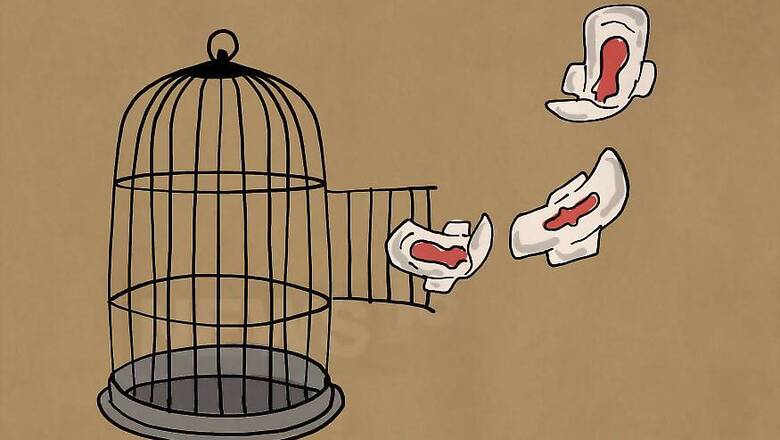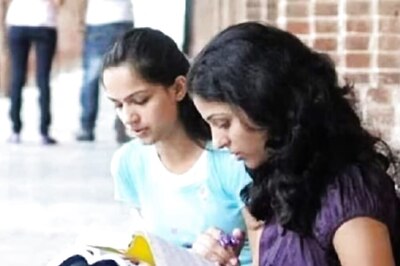
views
Earlier this year, during conversations at a women’s prison in Punjab, several women prisoners told my researcher colleague and myself that they had paid Rs 10 each for a packet of sanitary napkins from the canteen. Each packet contained three pads of 240 mm length, which were inadequate in size and number. These women were dependent on family members to provide quality sanitary pads during visits, or would have no choice but to resort to using making their own pads from old clothes.
One prisoner said it was generally difficult to ask for pads as it was the father or brother who visited her.
“Mahaul hi aisey banaya gaya hai (the whole setting around this makes us feel that way)," she said, explaining her embarrassment and pointing to the cultural pressures and context.
Various stakeholders, including the NITI Aaayog, observed May 28 as Menstrual Hygiene Day to highlight the importance of good menstrual hygiene management. But one group of women that received very little attention were women prisoners.
Access to sanitary products, safe and hygienic spaces in which to use them, and the right to manage menstruation in a dignified manner is a fundamental need of women and girls everywhere. This is applicable to prisons too, though the lack of basic infrastructure and provision of adequate sanitary products, makes achieving it a daunting task. Rule 5 of the UN Rules for the Treatment of Women Prisoners and Non-custodial Measures for Women Offenders 2010 (commonly known as the ‘Bangkok Rules’) require authorities to ensure facilities and materials to meet gender-specific needs, including the provision of sanitary towels free of charge, and a regular supply of water.
The rules under the Ministry of Home Affair’s Model Prison Manual 2016 also stipulate that ‘sterilised sanitary pads should be issued to women prisoners as per their requirements’. However, ground realities differ vastly.
The National Family Health Survey - 4 (2015-2016) reported that only about 58% of the country's menstruating population use a hygienic method of menstrual protection. This survey only interviewed women living in the households they approached, thus entirely excluding the 19242 women prisoners in the country.
A report by Commonwealth Human Rights Initiative (CHRI) for the Haryana State Legal Services Authority - Inside Haryana Prisons, underlined that most jails in Haryana were providing sanitary napkins. However, the team came across instances where women prisoners were unaware of the provision of free sanitary pads. The report also highlighted instances where women prisoners resorted to using clothes and rags. Further, interactions with the prison authorities in Haryana highlighted the fact that most prisons do not have permanent female medical officers. This is true for Punjab and Karnataka too, where CHRI has conducted similar audits inside prisons.
And there is the endemic problem of shortage of medical officers. In brief: only about half (647) the nationwide sanctioned posts (1178) for Medical Officers were filled in 2018, according to the Prison Statistics India report. Of these, only 72 are women. Stop-gap arrangements such as temporary appointments of lady doctors to visit women prisons/enclosures, as recommended by the Ministry of Women and Child Development’s report – Women in Prisons: India, have now become the norm. This has in practice led to irregular visits, as well as the practice of women prisoners being examined by male doctors, with whom they might not always feel comfortable sharing their concerns, especially on reproductive or menstrual health issues. A few women prisoners in the Mysuru Central Jail, shared about inconsistencies in their period during the course of our interactions. None of them had raised it with the male medical officer.
Practices towards the disposal of sanitary pads inside prisons is yet another area which lacks clear guidelines. A training session with the prison staff in Karnataka turned up information that women prisoners were instructed to wash their sanitary napkins before disposing it with other waste. In Mysuru Central Jail, one prisoner told us how they washed their used pads and collected them in a plastic bag during lock up and threw it into the common dustbin the next day. This practice is unhygienic, undesirable and contrary to procedures for safe disposal of sanitary napkins.
Limitations on the number of sanitary pads provided, coupled with dirty and unhygienic toilets have an adverse impact on the menstrual health and hygiene practices of women. The Bangkok Rules 2010 and the Model Prison Manual 2016, outline the basic minimum standards for securing rights of women prisoners, and it is crucial that the prison staff be sensitised through regular training and refresher courses. Here, a set of key recommendations on effective menstrual hygiene management in prisons calls upon prison administrations to ensure access to clean water and basic facilities, provide quality and sufficient quantity of sanitary pads, implement mechanisms for proper disposal of used pads, as well as ascertain reproductive health of women prisoners through regular doctor visits and raise awareness among the prison staff and prisoners on issues of menstrual hygiene.
Menstrual hygiene management in prisons, especially during the COVID-19 pandemic, must be prioritised by prison administrators across the country. As part of the measures to arrest the spread of COVID-19 in prisons, many prisons across the country have cancelled visits by doctors, counsellors and organisations that work to support the needs of inmates in prisons. At times like these when prisoners are already distressed by the lack of visits from family members and are facing increased risks due to overcrowding, the absence of appropriate means to maintain menstrual hygiene and visits by healthcare professionals only exacerbates the situation. If anything, the pandemic continues to highlight the limitations of stop-gap measures and necessitates systemic changes to ensure that prisons are equipped to address the gender-specific needs of women.
(The writer is Project Officer, Prison Reforms Programme, at the Commonwealth Human Rights Initiative (CHRI). Views are personal.)




















Comments
0 comment